The master-course “Psychiatric aspects of palliative care and pain management”, took place on November 28-30 2013, at the Aerostar Hotel on Lenigradskiy Prospekt in Moscow.
The master-course “Psychiatric aspects of palliative care and pain management”, took place on November 28-30 2013, at the Aerostar Hotel on Lenigradskiy Prospekt in Moscow.
The event organizer was the International Institute of Postgraduate Medical Education (IIPME), together with the European Medical Center (EMC) and the International Psycho-Oncology Society (IPOS), with the support of the European Association of Psychosomatic Medicine (EAPM).
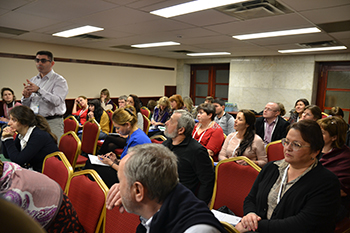 IIPME regularly conducts such events, which are consistently popular with health specialists. This is not surprising since the Russian medical postgraduate education system doesn’t have such training programs in the field of psychosomatic psychiatry, which are part of the standard model of patient care in Europe and the US.
IIPME regularly conducts such events, which are consistently popular with health specialists. This is not surprising since the Russian medical postgraduate education system doesn’t have such training programs in the field of psychosomatic psychiatry, which are part of the standard model of patient care in Europe and the US.
The recent master-course had around 90 participants from 13 cities in Russia, Ukraine and Kazakhstan. They were oncologists, psychiatrists, psychologists, social workers, students, teachers, and nurses.
The training was conducted by the following specialists from Europe and the US:
-
Professor Philip Bialer, USA, psychiatrist and Head of the Communication Skills Training and Research Laboratory, Department of Psychiatry, Memorial Sloan-Kettering Cancer Center, New York, USA.
Professor Katalin Muszbek, Hungary, psychiatrist and Head of the Hungarian Hospice Foundation.
Professor Agnes Ruzsa, Hungary, oncologist, President of the Hungarian Society of Clinical Oncologists.
Doctor Natalia Rivkina, Russia, Head of the Department of Psychiatry at the European Medical Center (GEMC), member of “Community psychiatry and psychiatric care organization” unit of the Federal State Funded Institution, the Moscow Research Institute of Psychiatry.
Natalia Rivkina talks about the problems faced by modern medicine: “The majority of oncological tumors can be treated these days, but patients are often unaware of this. The goal of the treating physician, when working with a patient, is to explain as much as possible about the disease and the effectiveness of treatment. Even if the oncologist is highly qualified and supportive, the frequency of depression and post traumatic disorders in patients is quite high.
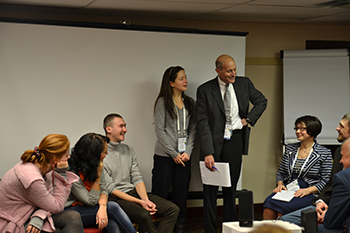 The laboratory, run by Mr. Bialer, has been educating oncologists from all over the world, for more than 10 years, about effective communication with patients and their families. Thanks to the recently held event, Russian specialists had the opportunity to gain this unique experience and be the first to use it in their work. The master-class consisted of a series of seminars and training sessions, where physicians could not only gain theoretical knowledge in the field of effective communication with patients, but also put these skills into practice. Every day, new complicated situations were played out by actors, where the doctors had to discuss the diagnosis and prognosis of an oncological disease with a “patient”, react to their anger and aggressive behavior, conduct a conversation with the “relatives”, announce the fact that a patient has been transferred to palliative care, and prepare them for the process of dying.
The laboratory, run by Mr. Bialer, has been educating oncologists from all over the world, for more than 10 years, about effective communication with patients and their families. Thanks to the recently held event, Russian specialists had the opportunity to gain this unique experience and be the first to use it in their work. The master-class consisted of a series of seminars and training sessions, where physicians could not only gain theoretical knowledge in the field of effective communication with patients, but also put these skills into practice. Every day, new complicated situations were played out by actors, where the doctors had to discuss the diagnosis and prognosis of an oncological disease with a “patient”, react to their anger and aggressive behavior, conduct a conversation with the “relatives”, announce the fact that a patient has been transferred to palliative care, and prepare them for the process of dying.
The main focus in the training sessions of a different psychiatrist, Katalin Muszbek, were variouis approaches to psychotherapy control of end of life symptoms (anxiety, depression, etc), specific psychotherapy methods for palliated patients, as well as providing support to people who are grieving the loss of a loved one.
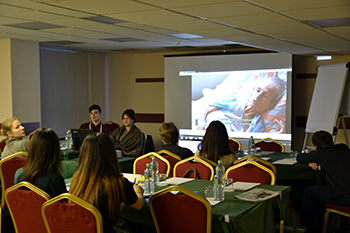 Professor Katalin Muszbek formed the first group of psycho-oncologists in Hungary in 1988, and is the Director of a hospice in Budapest. Dr. Muszbek is the founder and President of the Hungarian Association of Palliative Care. For 6 years, Dr. Muszbek was a member of the European Society of Psychosocial Oncology (ESPO), and she has been a member of the Board of Directors of the International Psycho-Oncology Society (IPOS) since 2006.
Professor Katalin Muszbek formed the first group of psycho-oncologists in Hungary in 1988, and is the Director of a hospice in Budapest. Dr. Muszbek is the founder and President of the Hungarian Association of Palliative Care. For 6 years, Dr. Muszbek was a member of the European Society of Psychosocial Oncology (ESPO), and she has been a member of the Board of Directors of the International Psycho-Oncology Society (IPOS) since 2006.
The master classes of the oncologist Professor Agnes Ruzsa from Hungary had a slightly different emphasis and were interactive, in the form of questions and answers. The topic of psychopharmacology, to control physical symptoms, was also touched on. Four cases were presented for discussion with the course participants, including the diagnosis, diagnostic procedures and recommended treatment.
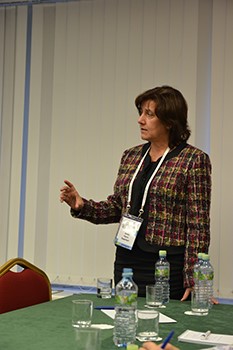 Professor Ruzsa is the founder of the Hungarian Society of Clinical Oncology, the Association for Palliative Care, and the Director of the Federal Program for Palliative Care at Home. Dr. Ruzsa also acts as the initiator and curator of international research projects in palliative medicine, investigates the psychiatric aspects of supporting terminal patients, and develops clinical practice guidelines for preventing and treating the side effects of chemotherapy.
Professor Ruzsa is the founder of the Hungarian Society of Clinical Oncology, the Association for Palliative Care, and the Director of the Federal Program for Palliative Care at Home. Dr. Ruzsa also acts as the initiator and curator of international research projects in palliative medicine, investigates the psychiatric aspects of supporting terminal patients, and develops clinical practice guidelines for preventing and treating the side effects of chemotherapy.
As an oncologist, Agnes Ruzsa pays particular attention to the need for interdisciplinary cooperation between doctors of various specialties. “I believe that training of specialists is incredibly important, not only oncologists and general practitioners, but also doctors of other specializations. Postgraduate education plays a major role in advancing the understanding of doctors about palliative care and teamwork in general.”
Katalin Muszbek shared her impression of the course: “I am very happy to be here and flattered that I have been invited to this event. Russia and Hungary have many things in common, like history, traditions, and the attitudes to healthcare as a whole. It is great that Russia has an organization like EMC, which strives to introduce the latest technologies into its practice. In regards to the event itself, of course we were discussing difficult issues. It is very important to teach the medical staff about the right way to deliver bad news, when the patient has cancer, how to control your emotions, how to ease the suffering of patients and their families, because this is the most important thing in palliative care, to alleviate suffering. This course was organized because, unfortunately, none of the current medical degrees include the provision of psychological support to patients and palliative care. Every doctor comes across this problem in their work, but not everyone is aware of it. Of course, we encountered some resistance from some of the doctors, but this happens in Hungary, as well as in Russia. The difference is that we’ve had these programs for the past 20 years. It’s very fortunate that today we are conducting such a course in Russia, for we believe that if we train even 60 doctors, they’ll pass this information on to their colleagues, and the knowledge will keep spreading out in an exponential manner.”
Philip Bialer was surprised by how open Russian doctors were and how keen to absorb the experience from the US, despite cultural differences: "I am amazed by how the doctors, who attended my training sessions, strove to learn new ways of interacting with patients and their family members. This area is developing very actively at the moment in the United States, mainly thanks to research institutions, although hospitals also play an important role."
This event also gained a lot of interest from the local scientific community. Vladimir Mikhailovich Yaltonskiy, PhD, Professor of the Faculty of Clinical Psychology at the Moscow State University of Medicine and Dentistry, plans to continue developing the area of psycho-oncology in Russia. “This school is a leader in psycho-oncology, and we have been given a rare chance to familiarize ourselves with this valuable experience. This area has not been studied in detail, even though it has highly practical aspects. I will certainly use the knowledge and skills that I’ve gained, when teaching psychologists from various organizations, as part of our retraining programs.”
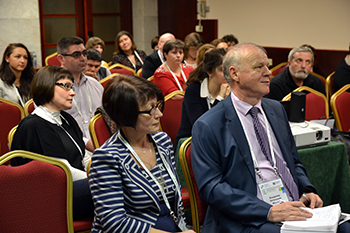 The event location merits a special mention. One of the participants was Irina Ageeva-Podobed, an oncologist and Head of the Department of Psychiatry in Chelyabinsk, who did not regret in the least the long trip to Moscow to participate in the training sessions run by Philip Bialer. “We don’t like to talk about death in this country. But it’s quite important to be able to appropriately discuss these complex topics with the patients. In our hospital, we raise these questions, but we lack the experience and the knowledge about how to do it properly. Unfortunately, doctors are rarely interested in such courses. I’m a psychologist and I only started working at the hospital because they were in dire need of qualified psychological support for patients. At the start, I was invited as a visiting psychologist, but then the number of problems kept growing. It’s important to realize that the main reason for conflicts is a lack of information. If the patient hasn’t been provided with sufficient information, they’ll naturally start to complain about the doctor, even though in the majority of cases, the complaints are not because the doctor isn’t treating them well or that the treatment is wrong, but because the patient isn’t feeling well. The most complex patients are dying patients, when the issue of palliative care is raised. We also have a Department of Pulmonology, where we have pediatric patients with cystic fibrosis - children with a life-shortening condition. We work with them openly, more openly than with cancer patients, because this is a diagnosis that is made at birth, and doctors try to prepare parents from the start about the early terminal outcome of the condition. But now I know that this can be discussed in a different way, that the whole family should be invited so that there is more support offered from all sides. We rarely do this, and it is usually quite a negative experience. This is due to the fact that we need the right technology in each case, a method for conversation. If we don’t have the right method, we start to invent things that already exist in the world. So it’s great that we’ve been given a chance to meet these experts. We have the opportunity to gain knowledge and ask questions. I like that the training is done in a constructive way, that Philip tries to keep to the topic and doesn’t get distracted, even though it’s difficult as all of us lack the knowledge. I can definitely say that from now on, I will approach my work slightly differently, and I will train some of our other doctors.”
The event location merits a special mention. One of the participants was Irina Ageeva-Podobed, an oncologist and Head of the Department of Psychiatry in Chelyabinsk, who did not regret in the least the long trip to Moscow to participate in the training sessions run by Philip Bialer. “We don’t like to talk about death in this country. But it’s quite important to be able to appropriately discuss these complex topics with the patients. In our hospital, we raise these questions, but we lack the experience and the knowledge about how to do it properly. Unfortunately, doctors are rarely interested in such courses. I’m a psychologist and I only started working at the hospital because they were in dire need of qualified psychological support for patients. At the start, I was invited as a visiting psychologist, but then the number of problems kept growing. It’s important to realize that the main reason for conflicts is a lack of information. If the patient hasn’t been provided with sufficient information, they’ll naturally start to complain about the doctor, even though in the majority of cases, the complaints are not because the doctor isn’t treating them well or that the treatment is wrong, but because the patient isn’t feeling well. The most complex patients are dying patients, when the issue of palliative care is raised. We also have a Department of Pulmonology, where we have pediatric patients with cystic fibrosis - children with a life-shortening condition. We work with them openly, more openly than with cancer patients, because this is a diagnosis that is made at birth, and doctors try to prepare parents from the start about the early terminal outcome of the condition. But now I know that this can be discussed in a different way, that the whole family should be invited so that there is more support offered from all sides. We rarely do this, and it is usually quite a negative experience. This is due to the fact that we need the right technology in each case, a method for conversation. If we don’t have the right method, we start to invent things that already exist in the world. So it’s great that we’ve been given a chance to meet these experts. We have the opportunity to gain knowledge and ask questions. I like that the training is done in a constructive way, that Philip tries to keep to the topic and doesn’t get distracted, even though it’s difficult as all of us lack the knowledge. I can definitely say that from now on, I will approach my work slightly differently, and I will train some of our other doctors.”
Ruslan Gabarev, a psychologist at the Department of Women’s Health at the V.P. Avayev Tverskoy Center for Specialized Medical Care: “This is certainly a very useful event. I’ve gained a lot here: new ways of communicating with patients, new methods of work. There’s no doubt that such events are important, because they bring together specialists from different hospitals, hospices, and cities. We share our experiences, compare how we work, how our colleagues work, and add new, useful techniques to our repertoire.”
Judging by the participants’ responses and their huge interest in this unique training program, it can be said with certainty that the psychotherapeutic support of cancer patients and their families, at any stage of treatment and rehabilitation, will become standard in Russia just like it has become standard in international medical practice.






